Peppers are fruit but are often mistaken for a vegetable. They belong to the nightshade family and have a slight relationship with tomatoes and chili peppers. Bell peppers belong to the nightshade family and apart from the green color, they can also be red and yellow in color (there are even more colors but these are the more common ones).
So, can guinea pigs eat green peppers? Guinea pigs can eat green peppers and the fact that they are full of vitamin C makes them an excellent addition to their diet. They also really enjoy the taste and the texture of the green peppers. Still, the serving size and frequency of green peppers need to be regulated due to the presence of sugars.
There is so much more to unravel when it comes to guinea pigs and green peppers. In the following sections below you will learn how they can help your guinea pig to grow strong and healthy, possible risks of having green papers in their diet, and how to feed guinea pigs with green bell peppers. Let’s begin!
Table of Content
Are Green Peppers Good for Guinea Pigs? | Health Benefits
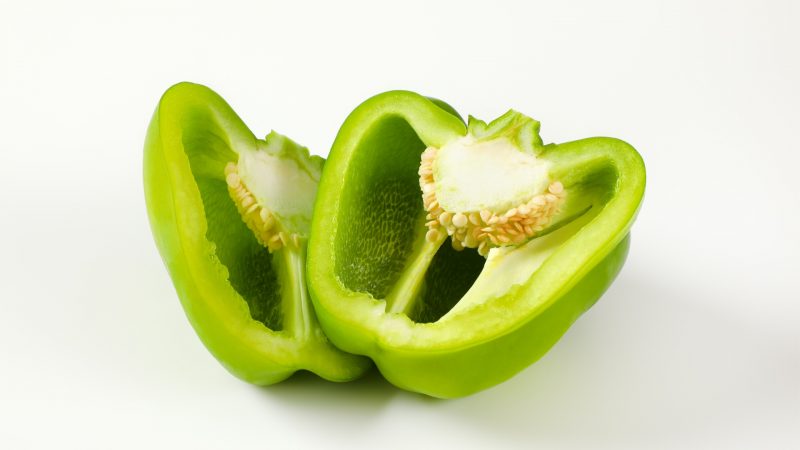
There are numerous health benefits that can be attributed to green peppers. In addition to the one already mentioned above related to vitamin C, there are still many others that we can highlight:
Eye Health
Green peppers have zeaxanthin, lutein, and carotenoids that are known nutrients for improving eye health. They work well when taken in reasonable amounts and prevent any eye-related complications in your guinea pigs.
Helps in Digestion
Green pepper has dietary fiber that allows the cavy to better digest food. It also helps to prevent constipation which is a common problem when roughage is missing in their diet.
Boosts the Immunity
Green pepper has good nutrients that help the guinea pig fight off diseases and infections that are prone to affect them. Vitamin E that is found in green peppers helps to prevent cell damage and boosts the immune system.
Green Peppers Can Help Deal With Anemia
This is a condition whereby the blood is unable to transport oxygen normally. Anemia is caused by a lack of iron and luckily iron can be found in green peppers. Also, the green peppers have vitamin C which helps to boost iron absorption in the body.
Elimination of Free Radicals
Vitamin E in green peppers is also a great antioxidant that prevents the accumulation of free radicals in the guinea pig’s body.
Prevent of the Scurvy Disease
We all know the numerous benefits of vitamin C includes the prevention of scurvy in guinea pigs. This vitamin is essential to cavies and any food that provides it is a must for these little pets. Green pepper is one of the best sources of this vitamin and is thus recommended for guinea pigs.
Other Vitamins
There are also other vitamins, such as vitamin K that help guinea pigs to develop strong bones and teeth, then vitamin B6 that helps guinea pigs to form red blood cells. Different minerals are also very beneficial for guinea pigs such as potassium found in green pepper that helps to improve heart health in cavies.
Nutrition Facts of Green Peppers for Guinea Pigs
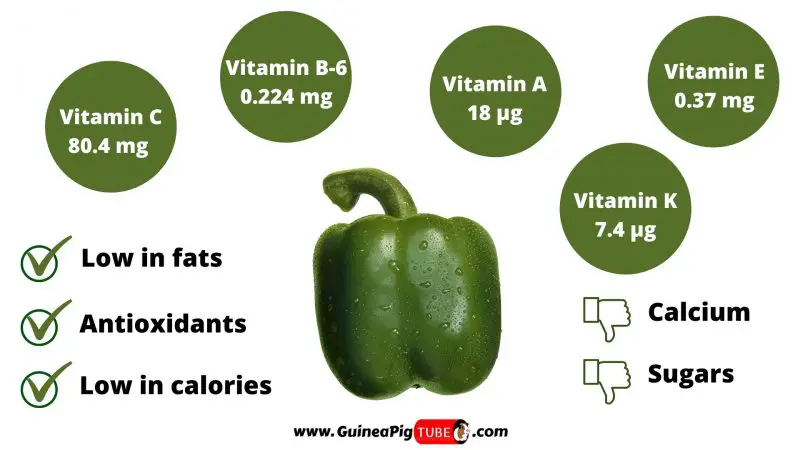
The following are the nutrients found in green peppers:
- Energy – 20 kcal
- Protein – 0.86 g
- Total lipid (fat) – 0.17 g
- Carbs – 4.64 g
- Dietary Fiber – 1.7 g
- Sugars – 2.4 g
- Calcium – 10 mg
- Iron – 0.34 mg
- Phosphorus – 20 mg
- Potassium – 175 mg
- Vitamin C – 80.4 mg
- Vitamin B-6 – 0.224 mg
- Vitamin A – 18 µg
- Vitamin E – 0.37 mg
- Vitamin K – 7.4 µg
- Niacin – 0.48 mg
- Folate – 10 µg
- Lutein + zeaxanthin – 341 µg
Risks to Consider When Feeding Green Peppers to Guinea Pigs
There are some potential risks associated with using green peppers in guinea pig’s diet. Although most of these risks are manageable, they are still worth mentioning. Below are some potential dangers for guinea pigs:
Allergy Possibility
Some cavies may have allergic reactions when they feed on green peppers. If you notice vomiting or diarrhea from the cavy when you give it, that may be a sign of an allergy. In short, if you see any allergic symptoms, it is wise to stop the feeding process right away. In case the situation gets worse, you should visit a professional vet for further assistance.
Problems With Digestion
If you feed guinea pigs with too many green peppers, they can disturb their digestive tract and this can lead to diarrhea, gases, or vomiting. Guinea pigs have a very sensitive digestive system. So, you need to be careful with the serving sizes you give to them because they sometimes don’t know when to stop eating.
Urinary Problems
Green peppers do not contain a large amount of calcium per 100 g unlike other fruits and vegetables. If you feed guinea pigs with a lot of green peppers, there is a possibility of developing urinary problems or even forming of kidney or bladder stones. Too much calcium isn’t good for adult guinea pigs, so it’s very important to feed them low calcium food in small amounts.
Serving Size and Frequency of Green Peppers for Guinea Pigs
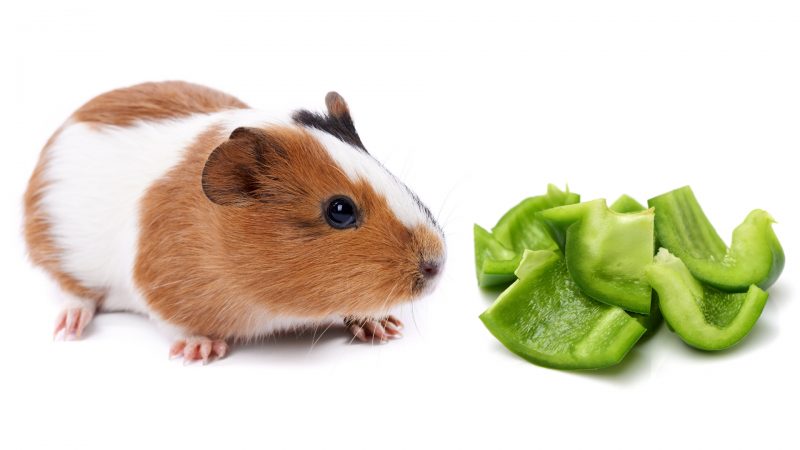
Can Guinea Pigs Have Green Peppers Every Day?
Guinea pigs shouldn’t eat green peppers every day. There are also other bell peppers that you can feed to your guinea pigs, such as red peppers, yellow peppers, orange peppers, and others. Guinea pigs need hay, pellets, and water every day. But it’s also important to provide them with a diverse and balanced diet with different fruits and vegetables all the time.
How Often Can Guinea Pigs Eat Green Peppers?
It’s recommended to give them a small amount of green pepper 2 or 3 times per week. This is an appropriate and safe amount of green bell peppers per week. This will provide them with enough good nutrients.
Can Guinea Pigs Eat a Whole Green Pepper?
Guinea pigs shouldn’t eat a whole green pepper, because this amount of green pepper is just too much for one guinea pig. You need to regulate the serving size of green bell peppers that you feed to your guinea pig. Overfeeding them can cause digestion problems. Also, there are possible health risks that can appear if your guinea pigs eat too many green peppers, that we’ve mentioned above in the risk section.
For one guinea pig, a recommended serving size is 1 or 2 slices of green bell pepper or half a cup. Also, it’s very important to wash the green peppers thoroughly with water before giving them to your guinea pigs. This is done because of the possible presence of pesticides on peppers that can cause damage to the guinea pig’s health and body.
More Information About Green Peppers and Guinea Pigs
Can Guinea Pigs Eat Raw Green Bell Peppers?
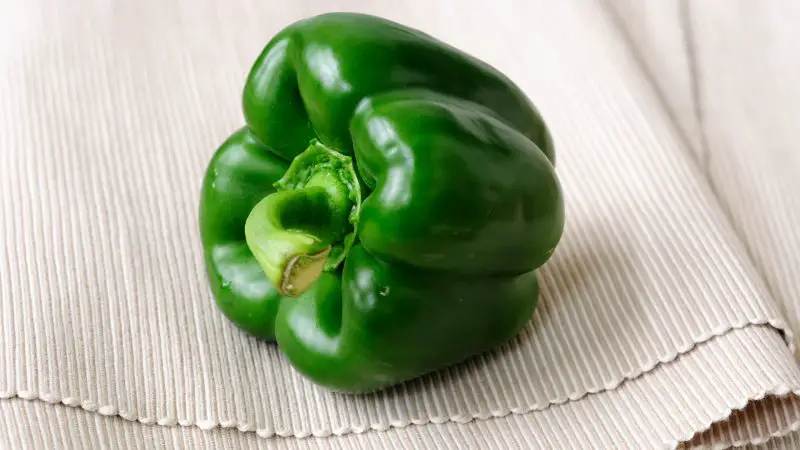
Guinea pigs can eat only raw green peppers which means that processed green peppers aren’t good for them. They are very small animals with a sensitive digestive system and they can’t eat any cooked food or food that has been processed in some way. Their digestive system isn’t made to process cooked food, so it’s very important to give them only fresh and raw green bell peppers.
Can Guinea Pigs Eat Sweet Green Peppers?
Guinea pigs can eat sweet green peppers and those are the only green peppers that are safe for them. There are also hot green peppers, like jalapenos peppers that aren’t good for guinea pig’s digestive system. Jalapenos peppers are hot chili peppers that can be very harmful to guinea pigs because they can cause some serious stomach problems.
Can Guinea Pigs Eat Green Bell Peppers Seeds?
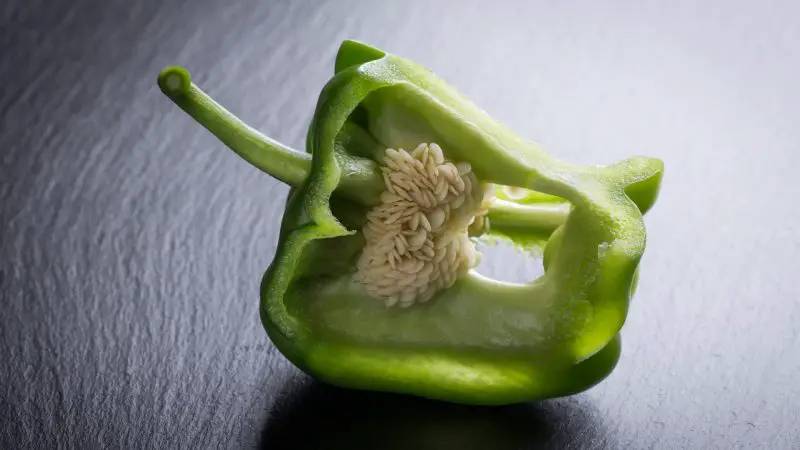
Green bell peppers seeds aren’t toxic to guinea pigs. Theoretically speaking they can eat green bell pepper seeds, but these seeds can present a choking hazard to your cavy and create problems that can be avoided if they are previously removed. Because of that, we don’t recommend feeding seeds of green peppers to guinea pigs.
Also, it is advisable to always have water nearby in case any problem occurs while your cavy is eating. Water is an excellent remedy to most feeding related issues.
Can Guinea Pigs Have Green Pepper Stems?
Unfortunately, guinea pigs can’t eat green pepper stems because the stems of this plant are quite sturdy and can pose a challenge for guinea pig’ s teeth and digestion. Also, green peppers stems can contain some alkaloids that can be harmful and toxic to guinea pigs if eaten in large amounts. Although some owners give stems of green bell peppers to guinea pigs, it’s best to remove them.
Quick Facts on Green Peppers
The following are some interesting facts on green peppers:
- The green peppers are one of the highest-ranking sources of vitamin C.
- Too much heat destroys the nutrients that are found in green peppers. That’s why they are best to be eaten raw, if possible.
- Sugar and nutrition increase as the green peppers mature.
- Green pepper is the most common of the other three bell pepper variants, i.e. red, white, purple, and yellow.
- People often put green pepper and black pepper in the same category which is not correct.
- There was an argument on whether green peppers are fruits or vegetables. They have seeds and also come from plants that flower. This is why they are fruits and not vegetables.
- These fruits trace their origin to Mexico and South America.
- The cultivation of bell peppers was spearheaded by the Portuguese and Spanish envoys.
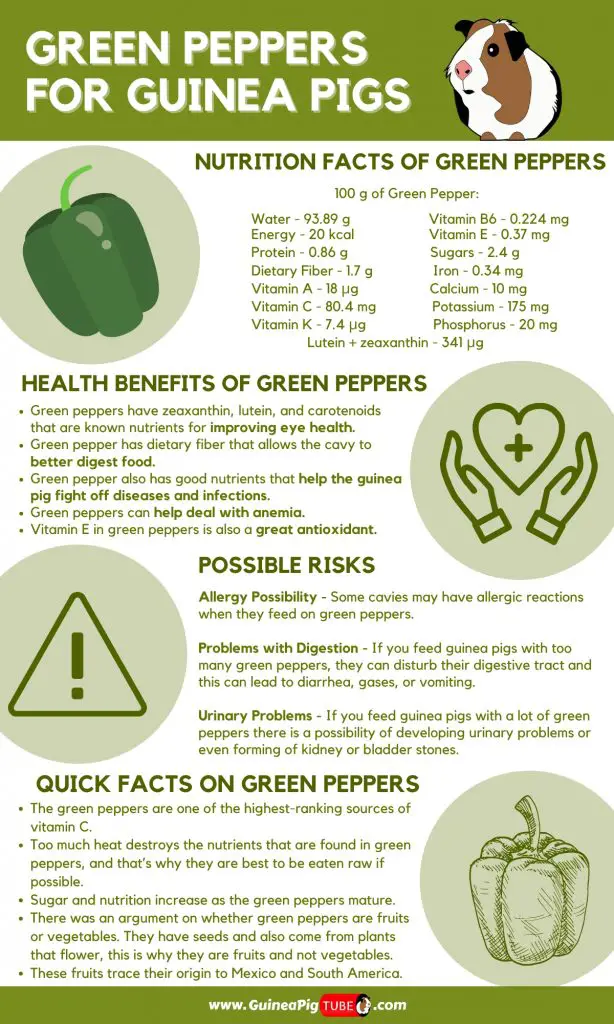
With food, you should be careful what to choose. If you are not sure what to feed them but believe your little piggies deserve some great treats, check our Helpful Guide to the Best Guinea Pig Treats to get some ideas.
We have also made a full list of foods that guinea pigs can and can’t eat (150+ Types of Foods). Be sure to also check our recommended products page for everything you will ever need to assure a happy life for your guinea pigs. Hope this information was helpful and you have found the answer you were looking for.
List of Sources
Vitamin C Requirements of the Guinea-Pig
Dietary Requirements of the Guinea Pig With Reference to the Need for a Special Factor
The Effects of Diet on Anatomy, Physiology and Health in the Guinea Pig
Bioactive Compounds and Antioxidant Activity in Different Grafted Varieties of Bell Pepper
